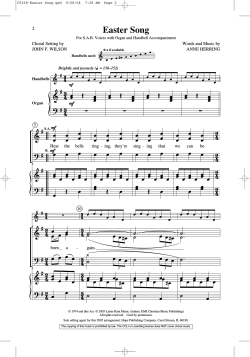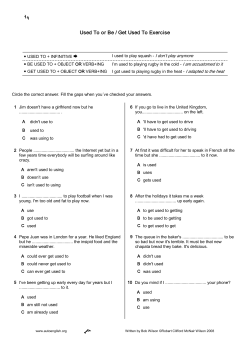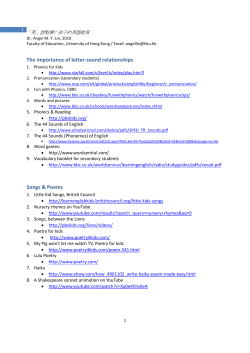
Document 248583
YY ILl! Lilt:: DIUI'It;.
ite
cs
50%
Source: Pew Forum on Religion and Public Life
Now, there remains the possibility
that some of those polled may not have
understood the implications of their an
swers. As John Green, a senior fellow at
the Pew Forum, said, "The capacity of
ignorance to influence survey outcomes
should never be underestimated." But I
don't think that they are ignorant about
this most basic tenet of their faith. I
think that they are choosing to ignore it
0
... for goodness sake.
Put Culture in the Cabinet
Iliam R. Ferris
CHAPEL HILL, N.C.
part of the New Deal,
Franklin Roosevelt cre
"'arm security Adminis
lich reached out to rural
) they struggled during
. Roy Stryker, who over
y's photo documentary
ured the strength of
Ire in the depths of the
air. The photographs of
, Dorothea Lange and
;howed us both the pain
the resilience of its peo
sident Lyndon Johnson
{as roots when he creat
Endowment for the Arts
1al Endowment for the
'ganizations that share
and humanities with the
Ie.
elt and Johnson demon
'ceful commitment to the
Id celebration of Ameri
and they did so in chal-
President-elect Barack
I, here's a suggestion.
lrS, America has devel
~ive array of federal cul
in addition to the en
~e arts and the human
lude the Corporation for
isting, the Institute of
,ibrary Services, the Li
ress, the National Ar
BS and the Smithsonian
l-
~se
organizations has
our nation's rich folk
C, stories and traditional
;Iuely powerful voice for
~
dowment for the Humanities from 1997
to 2001, I learned firsthand that these in
stitutions, though united by a shared
goal, can sometimes run into conflict
with one another. There were bureau cratic tangles, overlaps and missteps
that, with foresight, could have been
avoided.
Which is why I believe the president
should create a cabinet-level position
a secretary of culture - to provide
more cohesive leadership for these im·
pressive programs and to assure that
they receive the recognition and financ
ing they deserve.
The president should initiate another
Why We're Still-Happy
By Sonja Lyubomirsky
RIVERSIDE, Calif.
HESE days, bad news about
the economy is everywhere.
So Why aren't we panick-
ing? Why aren't we spending
our days dejected about the
markets? How is it that we manage to re
main mostly preoccupied with the quo
tidian tasks and concerns of life? Traffic,
dinner, homework, deadlines, sharp
words, flirtatious glances.
Because tile news these days affects
everyone.
Research in psychology and econom
ics suggests that when only your salary
is cut, or when only you make a foolish in
vestment, or when only you lose your job,
you become considerably less satisfied
with your life. But when everyone from
autoworkers to Wall Street financiers be
comes worse off, your life satisfaction re
mains pretty much tile same.
T
nan of the National En-
is is the senior associate
enter for the Study of the
~ at the University of
~t Chapel Hill.
change, too. The leaders of our cultural
institutions should all have renewable
lO-year appointments. (Some now serve
only four-year terms.) Such a change
would help to provide continuity and in
sulate the organizations from the tumult
of political change. This move would al
low each agency to develop long-term
agendas in coordination with the secre
tary of culture in each administration.
Mr. Obama has an opportunity to re
vitalize our national spirit by strength
ening our cultural programs at every
level. It's hard to imagine what could be
a more important - and enduring
legacy.
0
Sonja Lyubomirsky, a professor of psy
chology at the University of California,
Riverside, is the author of "The How of
Happiness: A Scientific Approach to Get
ting the Life You Want."
Indeed, humans are remarkably at
tuned to relative position and status. As
the economists David Hemenway and
Sara Solnick demonstrated in a study at
Harvard, many people would prefer to
receive an annual salary of $50,000 when
others are making $25,000 than to earn
$100,000 a year when others are making
$200,000.
Similarly, Daniel Zizzo and Andrew Os
wald, economists in Britain, conducted a
study that showed that people would give
up money if doing so would cause some
one else to give up a slightly larger sum.
That is, we will make ourselves poorer in
order to make someone else poorer, too.
Findings like these reveal an all-too
human trutil. We care more about social
comparison, status and rank than about
tile absolute value of our bank accounts
or reputations.
For example, Andrew Clark, an econo
mist in France, has recently shown that
being laid off hurts less if you live in a
community with a high unemployment
rate. What's more, if you are unem
ployed, you will, on average, be happier if
your spouse is unemployed, too.
So in a world in which just about all of
us have seen our retirement savings and
home values plummet, it's no wonder
0
that we all feel surprisingly O.K.
Money mat wasn't mere.
Plenty of people managed their credit
wisely. But much of the country, includ
ing many of the top government officials
and financial titans who were supposed
to be guarding the nation's wealth, acted
as if there would never be a day of reck
oning, a day when - inevitably - the
soaring markets would crash and the
bubbles explode.
We were stupid in so many ways. We
shipped American jobs overseas by the
millions and came up with the fiction
that this was a good deal for just about
everybody. We could have and should
have taken the time and made the effort
to think globalization through, to be
smarter about it and craft ways to cush
ion its more harmful effects and to share
its benefits more equitably,
We bought into the dopey idea that
you could radically cut taxes and still
maintain critical government services
and fight two wars to boot!
We were living in a dream world. The
general pUblic, and to a great extent the
press, closed its eyes to the increasingly
complex and baffling machinations of
the financial industry, which kept
screaming that oversight would ruin ev
erything.
We should have known better. It didn't
require a genius (or even an economics
degree) to understand a crucial point
that popped up some years ago in a
front-page article in The Wall Street
Journal: "Markets are a great way to or
ganize economic activity, but they need
adult supervision:'
Did Alan Greenspan not understand
that? Bob Rubin? Larry Summers?
Now that the reality of a stunning eco
nomic downturn has so roughly inter
vened, we at least have the option of be
ing smarter going forward. There is
broad agreement that we have no choice
but to go much more deeply into debt to
jump-start the economy. But we have
tremendous choices as to how we use
that debt.
We should use it to invest in the U.S.
in a world-class infrastructure (in its
broadest sense) to serve as the platform
for a world-class, 21st-century economy,
and in a system of education that actual
ly prepares American youngsters to deal
successfUlly with the real world they will
be encountering.
We need to invest in a health care sys
tem that improves the quality of Ameri
can lives, enhances productivity, puts
large numbers of additional people to •
work and eases the competitive burden
of U.S. corporations.
We need to care for our environment
(if long-term survival means anything to
us) and get serious about weaning our
selves from foreign oil.
And, finally, we need to start living
within our means and get past the nau
seating idea that the essence of our cul
ture and the be-all and end-all of the
American economy is the limitless con
sumption of trashy consumer goods.
It's time to stop being stupid.
0
/
80m; 'L'(, ~38W3J3a
:WmIruvs 'S3WIl )rnGA M3N 3Hl
A
O'lV
© Copyright 2025





















